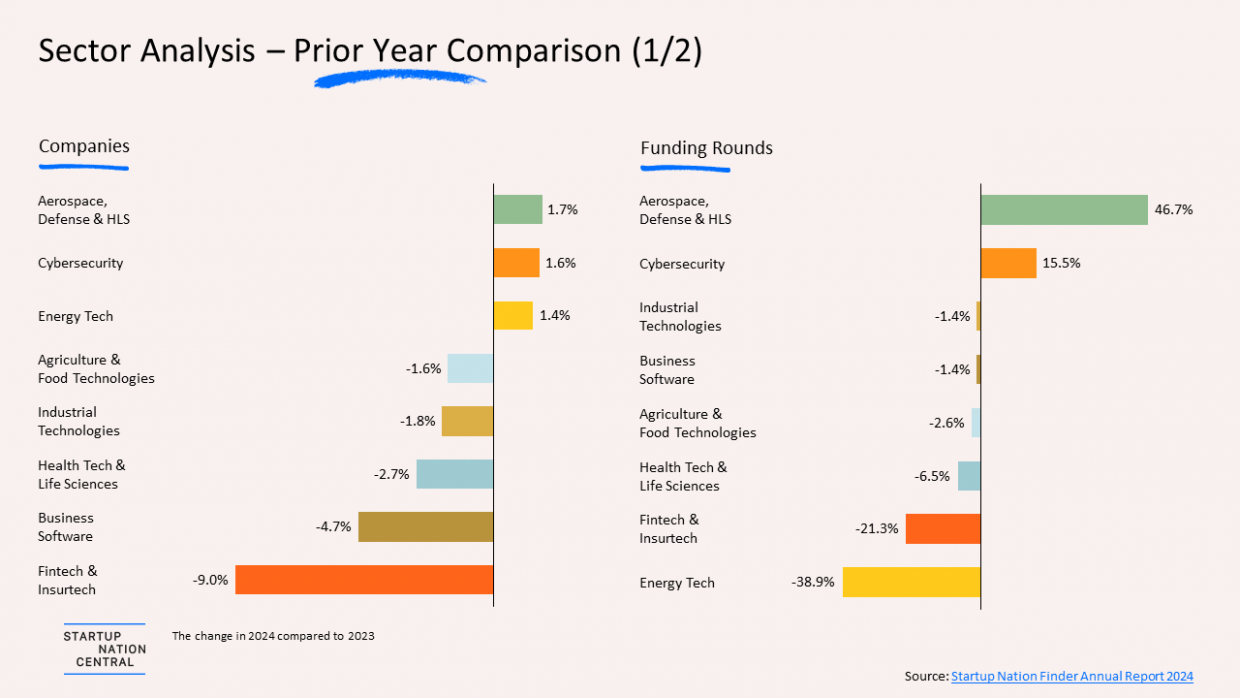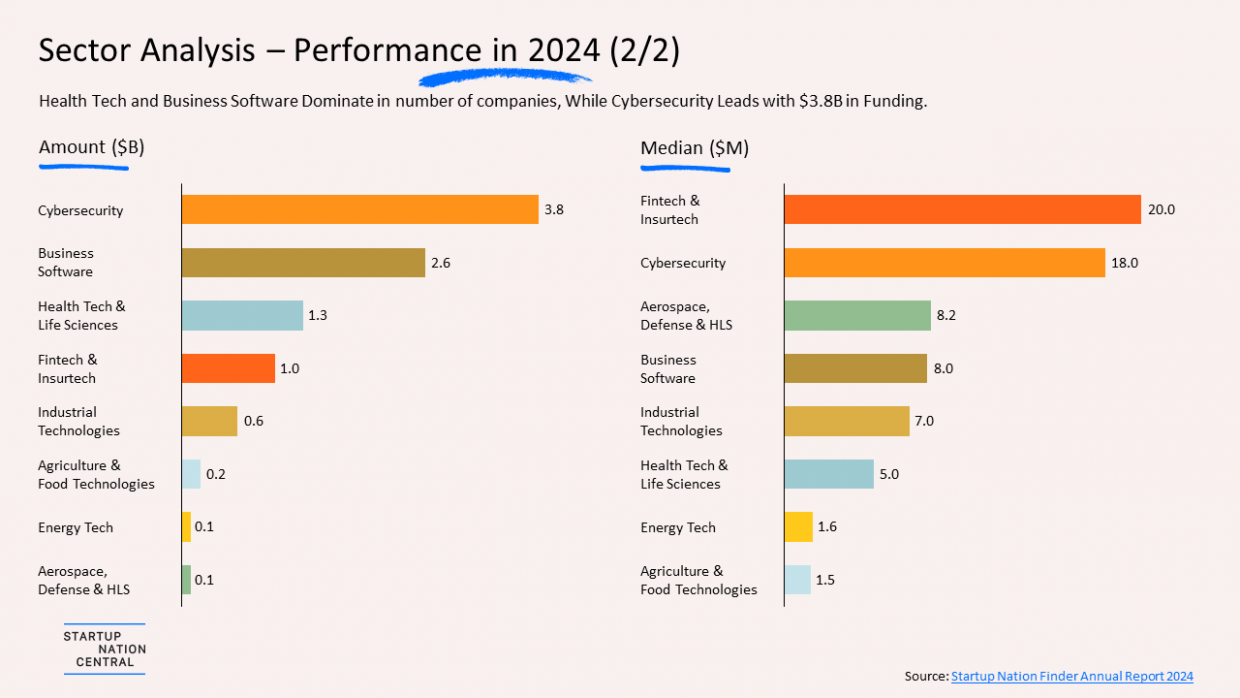Israeli Cyber Annual Insights and 2025 Trends
Cyber Security
Israel has established itself as a global leader in cybersecurity, with its roots deeply embedded in national security needs, military expertise, and an unparalleled innovation ecosystem. What began as a necessity for defending against cyber threats has transformed into a dominant industry that drives investment, technological advancements, and economic growth:
“The growing complexity of cyber threats, the rapid evolution of business landscapes, and regulatory pressures are elevating cybersecurity from a priority to a global necessity.”
– Yevgeny Dibrov, CEO of Armis Security
A Cybersecurity Powerhouse
According to the Startup Nation Finder 2024 Annual Report, Israeli cyber continues to lead the global landscape, rivaled only by the United States. The report highlights that Israel accounted for over 40% of U.S. private cybersecurity funding and that seven of the top 10 global cybersecurity companies maintain R&D centers in the country.
In 2024, Israeli cybersecurity companies raised $3.8 billion, representing 36% of total tech funding, with median funding round sizes more than double the average across Israel’s tech ecosystem. Major acquisitions also underscore the sector’s strength, including CyberArk’s $1.5 billion purchase of Venafi and Wiz’s acquisitions of Dazz ($450M) and Gem ($350M).
Beyond the numbers, the Israeli cybersecurity sector is home to 500+ companies. These firms benefit from Israel’s deeply integrated academic, governmental, and industry collaboration, with six dedicated cybersecurity research centers fostering continuous innovation.


From National Security to a Thriving Industry
Israeli cyber expertise stems from decades of investment in military technology and intelligence. The IDF’s elite cyber and intelligence units, particularly Unit 8200, have served as a training ground for world-class cyber professionals. Military conscription funnels top talent into these units, where they receive cutting-edge training before transitioning into the private sector, fueling Israel’s thriving startup ecosystem.
The government has played a critical role in nurturing this industry, viewing cybersecurity as a strategic national asset. Investments in R&D funds, technology incubators, and venture capital programs have fostered a vibrant ecosystem, ensuring Israel remains at the forefront of global cybersecurity innovation.
The Evolution of Cyber Threats and Israel’s Response
Cyber threats have evolved significantly over the past decade, shifting from simple espionage to large-scale disruptions targeting national infrastructure, financial markets, and even democratic processes. The Israel National Cyber Directorate (INCD), established in 2018, has taken a three-pronged approach to cybersecurity:
- Durability – Promoting cyber hygiene and implementing regulatory protections.
- Resilience – Ensuring rapid response and recovery from attacks.
- National Defense – Intelligence-led cyber warfare and offensive operations.
The National CERT (Cyber Emergency Response Team), based in Beersheba, operates 24/7 to mitigate cyber threats for both public and private sectors. These efforts have helped Israel defend against state-sponsored attacks and ensure national security in an increasingly digital world.
Key Trends in Israeli Cyber 2025 and Beyond
Our Finder 2024 Annual Report concludes that 2025 will be a pivotal year for cybersecurity. The industry is shifting from being solely a defense mechanism to becoming a boardroom priority and a driver of business growth.
According to Yevgeny Dibrov, CEO of Armis Security, the landscape is rapidly changing:
“When I look specifically at the field of cybersecurity, it’s evident that 2025 will be a pivotal year. The growing complexity of cyber threats, the rapid evolution of business landscapes, and regulatory pressures are elevating cybersecurity from a priority to a global necessity. The demand for unified platforms that provide comprehensive visibility, operational efficiency, and business-enabling capabilities will reach unprecedented levels. In 2025, we will see a shift toward platforms that deliver cost efficiency. Cybersecurity will no longer be solely about defense or confined to IT teams; it will emerge as a key driver of growth, innovation, and resilience, becoming a boardroom priority.”
The report outlines several major trends shaping the cybersecurity sector:
1. Cyber M&A and Industry Consolidation
With global cybersecurity budgets tightening, mergers and acquisitions (M&A) are expected to accelerate. Israeli firms are well-positioned to capitalize on this trend, consolidating to create stronger, more integrated cybersecurity companies that can compete on a global scale.
2. AI, Quantum Computing, and Advanced Data Technologies
To maintain its technological edge, Israel is prioritizing AI-driven cybersecurity solutions and quantum-resistant encryption. These advancements will ensure that Israeli firms remain ahead of the curve in combating evolving cyber threats.
3. Regulatory and Compliance Growth
As global cybersecurity regulations expand, demand for Israeli expertise in governance, risk management, and compliance is increasing. This presents a major opportunity for firms specializing in regulatory technology (RegTech) and risk assessment.
4. Balancing Military and Cyber Recruitment
While Israeli cyber talent pipeline fuels innovation, it also presents a challenge for traditional combat recruitment. With top candidates increasingly opting for cyber units over field operations, addressing this imbalance requires strategic national planning.
Israel’s Role in Global Cybersecurity Diplomacy
Recognizing that cyber threats transcend national borders, Israel is strengthening its international cybersecurity alliances. The INCD collaborates with over 70 cyber emergency centers worldwide, ensuring real-time intelligence sharing and coordinated defense efforts.
Key areas of Israeli cybersecurity diplomacy include:
- Defensive Collaboration Against State-Sponsored Attacks – Working with global partners to counter cyber threats from adversaries, particularly Iran.
- Cybersecurity in Civil Aviation – Setting global standards for securing air travel infrastructure, in collaboration with IAI, Check Point, and El Al.
- Election Security & Cyber Manipulation Protection – Leading efforts to safeguard democratic processes from cyber threats and disinformation campaigns.
The Future of Israeli Cyber
Israel’s cybersecurity dominance is no accident. It is the result of decades of military investment, government support, and an impatient innovation ecosystem that rapidly adapts to new challenges.
As cyber threats evolve, so too does Israel’s strategy of expanding AI and quantum computing capabilities, driving cyber M&A activity, and strengthening global partnerships.
Looking ahead, cybersecurity is no longer just about defense. As Yevgeny Dibrov emphasizes, it is becoming a growth driver and a business enabler:
“Looking ahead to 2025, there’s no denying the challenges we’ll face. But the innovative spirit, determination, and persistence of the Israeli tech industry give me every reason to feel confident.”
With its combination of strategic foresight, talent, and cutting-edge technology, Israel is set to remain at the forefront of global cybersecurity for years to come.
 Tech Ecosystem
Tech Ecosystem Human Capital
Human Capital Focus Sector
Focus Sector Business Opportunities
Business Opportunities Investment in Israel
Investment in Israel Innovation Diplomacy
Innovation Diplomacy Leadership Circle
Leadership Circle Our Story
Our Story Management Team
Management Team Careers
Careers